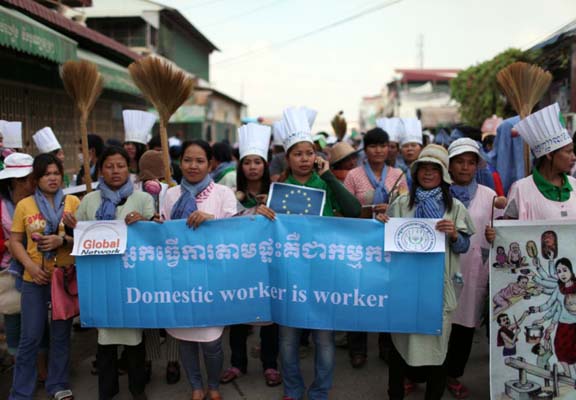
31st January 2017
By Jolovan Wham
Last month, the Singapore Ministry of Manpower announced that Cambodia will be a source country for domestic workers from 2017. According to media reports, between 1000 to 1200 domestic workers will be recruited by employment agencies here. This is three times the number now in Singapore.
While we welcome the diversification of the migrant workforce in Singapore, we are concerned about the employment of Cambodian women in Singapore when safeguards against deceptive recruitment and exploitation are not adequate. The Straits Times report (More maids from Cambodia next year, Dec 23, 2016) revealed that many Cambodian domestic workers who worked under the pilot scheme which began in 2013 could not communicate well in English. This mirrors HOME’s experience providing assistance to 4 Cambodian women who stayed in our shelter. All of them could not speak English well and experienced verbal, physical and financial abuse.
In HOME’s experience providing assistance to run away domestic workers, the ones who are most vulnerable to abuse speak little or no English at all. In a study conducted by HOME in 2014, we found that 24% of the 670 domestic workers we surveyed on the streets had poor mental health. Our findings also revealed that poor communication was a major risk factor for mental health.
We are also concerned about underage girls who are lured by exaggerated and false promises only to find that life in Singapore as a live-in domestic workers leaves them vulnerable to long working hours, lack of rest days and a heavy recruitment debt. In the last two years, HOME has seen an increase in number of underage domestic workers from Myanmar with many of them facing the problems described.
TWC2 sheltered one Cambodian worker and assisted two others during the pilot programme. Our research with Indonesian, Filipina and Myanmar domestic workers indicated that Myanmar workers are the most likely to speak little or no English, to secure jobs by irregular channels and to be under age when hired. They tend to be the lowest paid and least likely to have regular days off. We are concerned that Cambodian domestic workers may find themselves in the same position.
Agencies in Cambodia charge high recruitment fees and do not provide adequate pre-departure training, especially on language, legal and employment rights. Hefty debts, combined with lack of labour protections make them highly vulnerable to slavery like working conditions.
We urge the Singapore and Cambodian governments to work together to ensure that Cambodian women are recruited through legal means and receive culturally appropriate training before they are deployed to households here. They should also be educated about their legal rights. We need to ensure that the workers are not burdened with huge recruitment fees (We believe, on the contrary, that migrant workers should pay zero fees to obtain a job). Working for months on end with little or no salary is a disincentive for many domestic workers who often escape their employer’s homes because they are demoralised, unmotivated and unable to communicate with their employers. The problem is made worse by the common practice of denying days off while the women are paying off their recruitment debts and severely restricting the use of their mobile phones.
We appeal to both governments to work together with NGOs, unions, employer groups and employment agencies associations to tackle these problems, and to involve all parties in operational and policy decisions to safeguard the wellbeing of Cambodian women in Singapore.
Signed by:
Recruitmentreform.org features initiatives of civil society organizations, statements, policy advocacy campaigns and calls to action. If you would like us to share information concerning your campaigns please send us an e-mail at: mfa@mfasia.org
To view original source please click the link below:
Are protections for Cambodian domestic workers in Singapore adequate?


